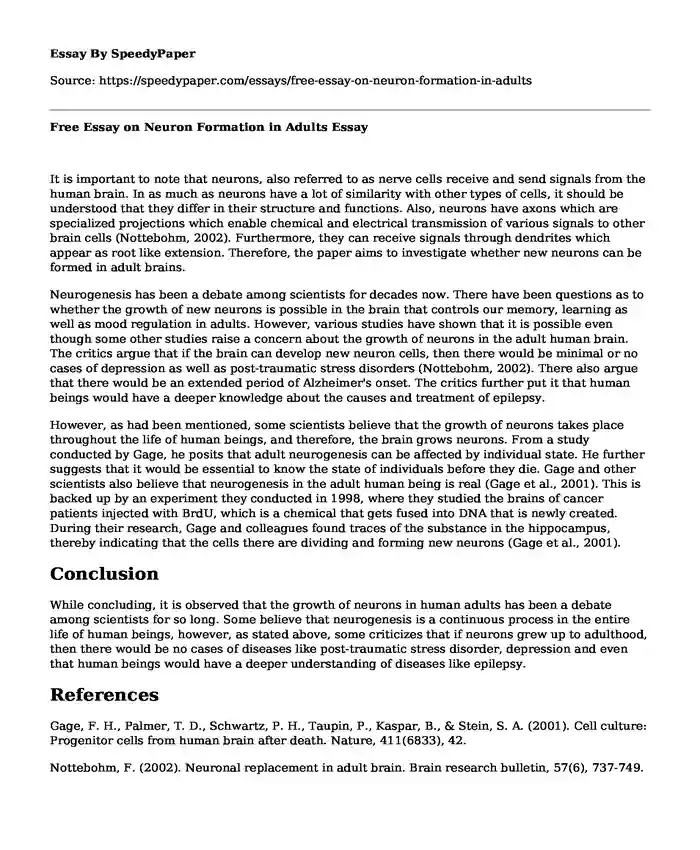It is important to note that neurons, also referred to as nerve cells receive and send signals from the human brain. In as much as neurons have a lot of similarity with other types of cells, it should be understood that they differ in their structure and functions. Also, neurons have axons which are specialized projections which enable chemical and electrical transmission of various signals to other brain cells (Nottebohm, 2002). Furthermore, they can receive signals through dendrites which appear as root like extension. Therefore, the paper aims to investigate whether new neurons can be formed in adult brains.
Neurogenesis has been a debate among scientists for decades now. There have been questions as to whether the growth of new neurons is possible in the brain that controls our memory, learning as well as mood regulation in adults. However, various studies have shown that it is possible even though some other studies raise a concern about the growth of neurons in the adult human brain. The critics argue that if the brain can develop new neuron cells, then there would be minimal or no cases of depression as well as post-traumatic stress disorders (Nottebohm, 2002). There also argue that there would be an extended period of Alzheimer's onset. The critics further put it that human beings would have a deeper knowledge about the causes and treatment of epilepsy.
However, as had been mentioned, some scientists believe that the growth of neurons takes place throughout the life of human beings, and therefore, the brain grows neurons. From a study conducted by Gage, he posits that adult neurogenesis can be affected by individual state. He further suggests that it would be essential to know the state of individuals before they die. Gage and other scientists also believe that neurogenesis in the adult human being is real (Gage et al., 2001). This is backed up by an experiment they conducted in 1998, where they studied the brains of cancer patients injected with BrdU, which is a chemical that gets fused into DNA that is newly created. During their research, Gage and colleagues found traces of the substance in the hippocampus, thereby indicating that the cells there are dividing and forming new neurons (Gage et al., 2001).
Conclusion
While concluding, it is observed that the growth of neurons in human adults has been a debate among scientists for so long. Some believe that neurogenesis is a continuous process in the entire life of human beings, however, as stated above, some criticizes that if neurons grew up to adulthood, then there would be no cases of diseases like post-traumatic stress disorder, depression and even that human beings would have a deeper understanding of diseases like epilepsy.
References
Gage, F. H., Palmer, T. D., Schwartz, P. H., Taupin, P., Kaspar, B., & Stein, S. A. (2001). Cell culture: Progenitor cells from human brain after death. Nature, 411(6833), 42.
Nottebohm, F. (2002). Neuronal replacement in adult brain. Brain research bulletin, 57(6), 737-749.
Cite this page
Free Essay on Neuron Formation in Adults. (2023, Jan 22). Retrieved from https://speedypaper.com/essays/free-essay-on-neuron-formation-in-adults
Request Removal
If you are the original author of this essay and no longer wish to have it published on the SpeedyPaper website, please click below to request its removal:
- Free Essay: Philosophers' Opinions on Reality and Existence of Knowledge
- Incidents in the Life of a Slave Girl
- Free Essay on Puritanism in North America
- Explanation of Demand and Supply Curves Shapes - Free Essay
- Media Advertising for Bleeding Heart Restaurant (BHR), Essay Example
- Free Essay Sample: Customer Relationship Management at Amazon
- Free Essay. Military Should Lower Age Requirement
Popular categories





